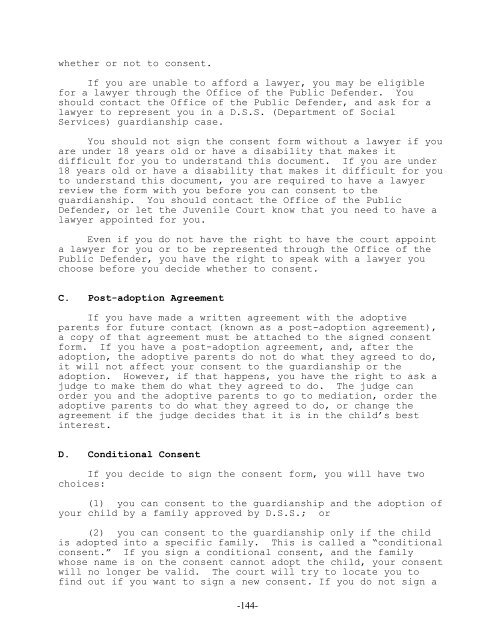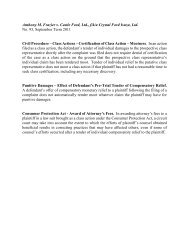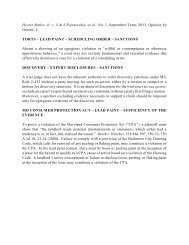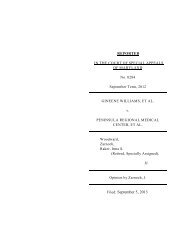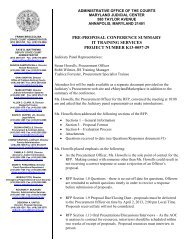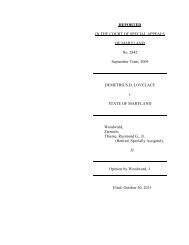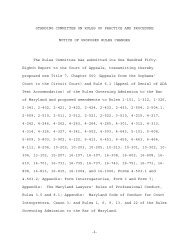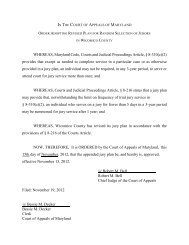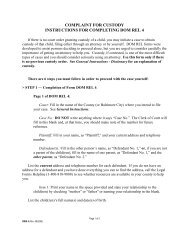- Page 1 and 2:
STANDING COMMITTEE ON RULES OF PRAC
- Page 3 and 4:
December 19, 2006 ONE HUNDRED FIFTY
- Page 5 and 6:
of probation proceeding is proposed
- Page 7 and 8:
litigation. The proposed amendments
- Page 9 and 10:
MARYLAND RULES OF PROCEDURE TITLE 3
- Page 11 and 12:
Source: This Rule is derived from f
- Page 13 and 14:
Source: This Rule is derived from f
- Page 15 and 16:
of the amendment, whichever is late
- Page 17 and 18:
MARYLAND RULES OF PROCEDURE TITLE 2
- Page 19 and 20:
as of right; and (F) (H) any other
- Page 21 and 22:
MARYLAND RULES OF PROCEDURE TITLE 2
- Page 23 and 24:
MARYLAND RULES OF PROCEDURE TITLE 2
- Page 25 and 26:
MARYLAND RULES OF PROCEDURE TITLE 2
- Page 27 and 28:
REPORTER’S NOTE Chapter 534, Laws
- Page 29 and 30:
REPORTER’S NOTE See the Reporter
- Page 31 and 32:
MARYLAND RULES OF PROCEDURE TITLE 3
- Page 33 and 34:
Insurance Commissioner of Maryland
- Page 35 and 36:
MARYLAND RULES OF PROCEDURE TITLE 4
- Page 37 and 38:
Section (d) (c) is derived from for
- Page 39 and 40:
under Rule 4-345, or the defendant
- Page 41 and 42:
under Code, Criminal Procedure Arti
- Page 43 and 44:
-43- ______ ______ proven not prove
- Page 45 and 46:
custody, arrest, or detention of or
- Page 47 and 48:
contendere to a charge of a crime o
- Page 49 and 50:
to conform his or her conduct to th
- Page 51 and 52:
of us, but fewer than all 12, find
- Page 53 and 54:
We unanimously determine the senten
- Page 55 and 56:
MARYLAND RULES OF PROCEDURE TITLE 4
- Page 57 and 58:
MARYLAND RULES OF PROCEDURE TITLE 4
- Page 59 and 60:
within 15 days after service of the
- Page 61 and 62:
language of the proposed amendment
- Page 63 and 64:
irregularity. If the appeal is rein
- Page 65 and 66:
taking into consideration all relev
- Page 67 and 68:
MARYLAND RULES OF PROCEDURE TITLE 9
- Page 69 and 70:
(c) Service (d) Response (e) Hearin
- Page 71 and 72:
Family Law Article, Titles 1 and 5
- Page 73 and 74:
MARYLAND RULES OF PROCEDURE TITLE 9
- Page 75 and 76:
Agency Guardianship), Form 9-102.9
- Page 77 and 78:
(C) Notice The court shall send to
- Page 79 and 80:
(c) If I choose to seek the appoint
- Page 81 and 82:
child or I or my child's other biol
- Page 83 and 84:
the right to be notified when the p
- Page 85 and 86:
3. Right to Attorney. I understand
- Page 87 and 88:
adopt me and I will no longer be th
- Page 89 and 90:
had it read to me in a language tha
- Page 91 and 92:
in subsection (b)(2)(B)(iv) and add
- Page 93 and 94: (H) If the person to be adopted is
- Page 95 and 96: equired affidavits of translators o
- Page 97 and 98: ehalf of each petitioner in connect
- Page 99 and 100: e stated is known to a child placem
- Page 101 and 102: affect the consent signed by the pe
- Page 103 and 104: Promptly Upon upon the filing of a
- Page 105 and 106: directs to be served. (B) If the pa
- Page 107 and 108: e published at least one time in on
- Page 109 and 110: IMPORTANT THIS IS A COURT ORDER. IF
- Page 111 and 112: WHETHER THE PETITION REQUESTS ADOPT
- Page 113 and 114: participate effectively in the case
- Page 115 and 116: ___________________________________
- Page 117 and 118: [ ] because of a disability, I am i
- Page 119 and 120: e in the form required by Code, Fam
- Page 121 and 122: MARYLAND RULES OF PROCEDURE TITLE 9
- Page 123 and 124: (D) §5-3B-21 in an Independent Ado
- Page 125 and 126: MARYLAND RULES OF PROCEDURE TITLE 9
- Page 127 and 128: challenging the standing of the per
- Page 129 and 130: MARYLAND RULES OF PROCEDURE TITLE 9
- Page 131 and 132: In ruling on a petition for adoptio
- Page 133 and 134: MARYLAND RULES OF PROCEDURE TITLE 9
- Page 135 and 136: MARYLAND RULES OF PROCEDURE TITLE 9
- Page 137 and 138: For the legal effect of adoption of
- Page 139 and 140: Cross reference: See Code, Health-G
- Page 141 and 142: exchanged by agreement. (b) Content
- Page 143: MARYLAND RULES OF PROCEDURE TITLE 9
- Page 147 and 148: handled under the Indian Child Welf
- Page 149 and 150: (b) I was married to the mother of
- Page 151 and 152: F. Effect of this Consent I UNDERST
- Page 153 and 154: MARYLAND RULES OF PROCEDURE TITLE 9
- Page 155 and 156: een taken away (guardianship has be
- Page 157 and 158: If you or your child are members of
- Page 159 and 160: CONSENT TO GUARDIANSHIP WITH THE RI
- Page 161 and 162: [ ] I voluntarily and of my own fre
- Page 163 and 164: (Printed Name) ____________________
- Page 165 and 166: B. Right to Speak with a Lawyer You
- Page 167 and 168: charges or fees for adoption counse
- Page 169 and 170: Use a pen to fill out this form. Yo
- Page 171 and 172: Check one of the following: [ ] I g
- Page 173 and 174: ________________________________ (C
- Page 175 and 176: this document. B. Right to Speak wi
- Page 177 and 178: of your child or for your agreement
- Page 179 and 180: CONSENT TO INDEPENDENT ADOPTION OF
- Page 181 and 182: D. Consent I voluntarily and of my
- Page 183 and 184: IF YOU HAVE A POST-ADOPTION AGREEME
- Page 185 and 186: B. Right to Speak with a Lawyer You
- Page 187 and 188: Attached to this document is a copy
- Page 189 and 190: CONSENT TO INDEPENDENT ADOPTION WIT
- Page 191 and 192: E. Notice Check one of the followin
- Page 193 and 194: MARYLAND RULES OF PROCEDURE TITLE 9
- Page 195 and 196:
Social Services Administration of t
- Page 197 and 198:
MARYLAND RULES OF PROCEDURE TITLE 9
- Page 199 and 200:
CONSENT OF ________________________
- Page 201 and 202:
Human Resources for adoption search
- Page 203 and 204:
MARYLAND RULES OF PROCEDURE TITLE 9
- Page 205 and 206:
knowledge, information, and belief.
- Page 207 and 208:
___________________________________
- Page 209 and 210:
MARYLAND RULES OF PROCEDURE TITLE 9
- Page 211 and 212:
knowledge, information, and belief.
- Page 213 and 214:
terminate parental rights and adopt
- Page 215 and 216:
party; (5) past or current mental h
- Page 217 and 218:
REPORTER’S NOTE Proposed new Rule
- Page 219 and 220:
of child’s counsel. The terminolo
- Page 221 and 222:
their roles as parents or custodian
- Page 223 and 224:
waived or (2) placing the waiver or
- Page 225 and 226:
Each court should develop a compens
- Page 227 and 228:
Rule 2-504 is proposed to be amende
- Page 229 and 230:
They are not designed to be a basis
- Page 231 and 232:
whether because of minority, mental
- Page 233 and 234:
follows: MARYLAND RULES OF PROCEDUR
- Page 235 and 236:
Cross reference: See Md. Const., Ar
- Page 237 and 238:
Under the proposed amendment, excep
- Page 239 and 240:
The presence of a majority of the m
- Page 241 and 242:
complainant of the right to file a
- Page 243 and 244:
Counsel to issue a subpoena to obta
- Page 245 and 246:
The Board may authorize a further i
- Page 247 and 248:
(l) Action by Commission The Commis
- Page 249 and 250:
(1) Upon application by Investigati
- Page 251 and 252:
MARYLAND RULES OF PROCEDURE TITLE 1
- Page 253 and 254:
2. "Local administrative judge" mea
- Page 255 and 256:
(iii) The use of electronic or phot
- Page 257 and 258:
proceedings, and cases involving tr
- Page 259 and 260:
3. 6. Not more than one audio syste
- Page 261 and 262:
New language is proposed to be adde
- Page 263 and 264:
In addition to the mailed notice, t
- Page 265 and 266:
Upon payment in cash or by certifie
- Page 267 and 268:
estores the lawyer to good standing
- Page 269 and 270:
shall prepare, certify, and file wi
- Page 271 and 272:
MARYLAND RULES OF PROCEDURE TITLE 1
- Page 273 and 274:
MARYLAND RULES OF PROCEDURE APPENDI
- Page 275 and 276:
MARYLAND RULES OF PROCEDURE TITLE 1
- Page 277 and 278:
MARYLAND RULES OF PROCEDURE TITLE 9
- Page 279 and 280:
MARYLAND RULES OF PROCEDURE TITLE 1
- Page 281 and 282:
issues. In light of this change, th
- Page 283 and 284:
REPORTER’S NOTE See the Reporter
- Page 285 and 286:
price as set forth in the report of
- Page 287 and 288:
should advise the client about thos
- Page 289 and 290:
follows: MARYLAND RULES OF PROCEDUR
- Page 291 and 292:
follows: MARYLAND RULES OF PROCEDUR
- Page 293 and 294:
follows: MARYLAND RULES OF PROCEDUR
- Page 295 and 296:
REPORTER’S NOTE Russell Butler, E
- Page 297 and 298:
(1) Contents (2) Exhibits (c) Petit
- Page 299 and 300:
MARYLAND RULES OF PROCEDURE TITLE 9
- Page 301 and 302:
MARYLAND RULES OF PROCEDURE TITLE 9
- Page 303 and 304:
The time for revocation of consent
- Page 305 and 306:
MARYLAND RULES OF PROCEDURE TITLE 9
- Page 307 and 308:
the guardian and a reference to the
- Page 309 and 310:
in compliance with the jurisdiction
- Page 311 and 312:
epresented. (4) §§5-3B-06 and 5-3
- Page 313 and 314:
MARYLAND RULES OF PROCEDURE TITLE 9
- Page 315 and 316:
court shall appoint an attorney who
- Page 317 and 318:
(Note to Drafter of Show Cause Orde
- Page 319 and 320:
participate effectively in the adop
- Page 321 and 322:
___________________________________
- Page 323 and 324:
[ ] I am the person to be adopted a
- Page 325 and 326:
MARYLAND RULES OF PROCEDURE TITLE 9
- Page 327 and 328:
The court shall order an investigat
- Page 329 and 330:
If the show cause order is served o
- Page 331 and 332:
MARYLAND RULES OF PROCEDURE TITLE 9
- Page 333 and 334:
of the presence of all persons othe
- Page 335 and 336:
MARYLAND RULES OF PROCEDURE TITLE 9
- Page 337 and 338:
Before entering a judgment of adopt
- Page 339 and 340:
the Department of Health and Mental
- Page 341 and 342:
MARYLAND RULES OF PROCEDURE TITLE 9
- Page 343 and 344:
If you are unable to afford a lawye
- Page 345 and 346:
consent form will also be filed in
- Page 347 and 348:
CONSENT TO GUARDIANSHIP WITH THE RI
- Page 349 and 350:
D. Notice ending (termination) of m
- Page 351 and 352:
________________________________ (C
- Page 353 and 354:
You have the right to speak with a
- Page 355 and 356:
1. The adoption agency does not pla
- Page 357 and 358:
CONSENT TO GUARDIANSHIP WITH THE RI
- Page 359 and 360:
[ ] I voluntarily and of my own fre
- Page 361 and 362:
(Printed Name) ____________________
- Page 363 and 364:
You have the right to speak with a
- Page 365 and 366:
I. Access to Birth and Adoption Rec
- Page 367 and 368:
Use a pen to fill out this form. Yo
- Page 369 and 370:
Check one of the following: [ ] I g
- Page 371 and 372:
________________________________ (C
- Page 373 and 374:
B. Right to Speak with a Lawyer You
- Page 375 and 376:
charges or fees for adoption counse
- Page 377 and 378:
CONSENT TO INDEPENDENT ADOPTION OF
- Page 379 and 380:
D. Consent I voluntarily and of my
- Page 381 and 382:
IF YOU HAVE A POST-ADOPTION AGREEME
- Page 383 and 384:
B. Right to Speak with a Lawyer You
- Page 385 and 386:
Attached to this document is a copy
- Page 387 and 388:
CONSENT TO INDEPENDENT ADOPTION WIT
- Page 389 and 390:
E. Notice Check one of the followin
- Page 391 and 392:
MARYLAND RULES OF PROCEDURE TITLE 9
- Page 393 and 394:
irth parents, my siblings, or I may
- Page 395 and 396:
MARYLAND RULES OF PROCEDURE TITLE 9
- Page 397 and 398:
CONSENT OF ________________________
- Page 399 and 400:
Human Resources for adoption search
- Page 401 and 402:
MARYLAND RULES OF PROCEDURE TITLE 9
- Page 403 and 404:
___________________________ _______
- Page 405 and 406:
disability is _____________________
- Page 407 and 408:
MARYLAND RULES OF PROCEDURE TITLE 9
- Page 409:
________________________________ (A


